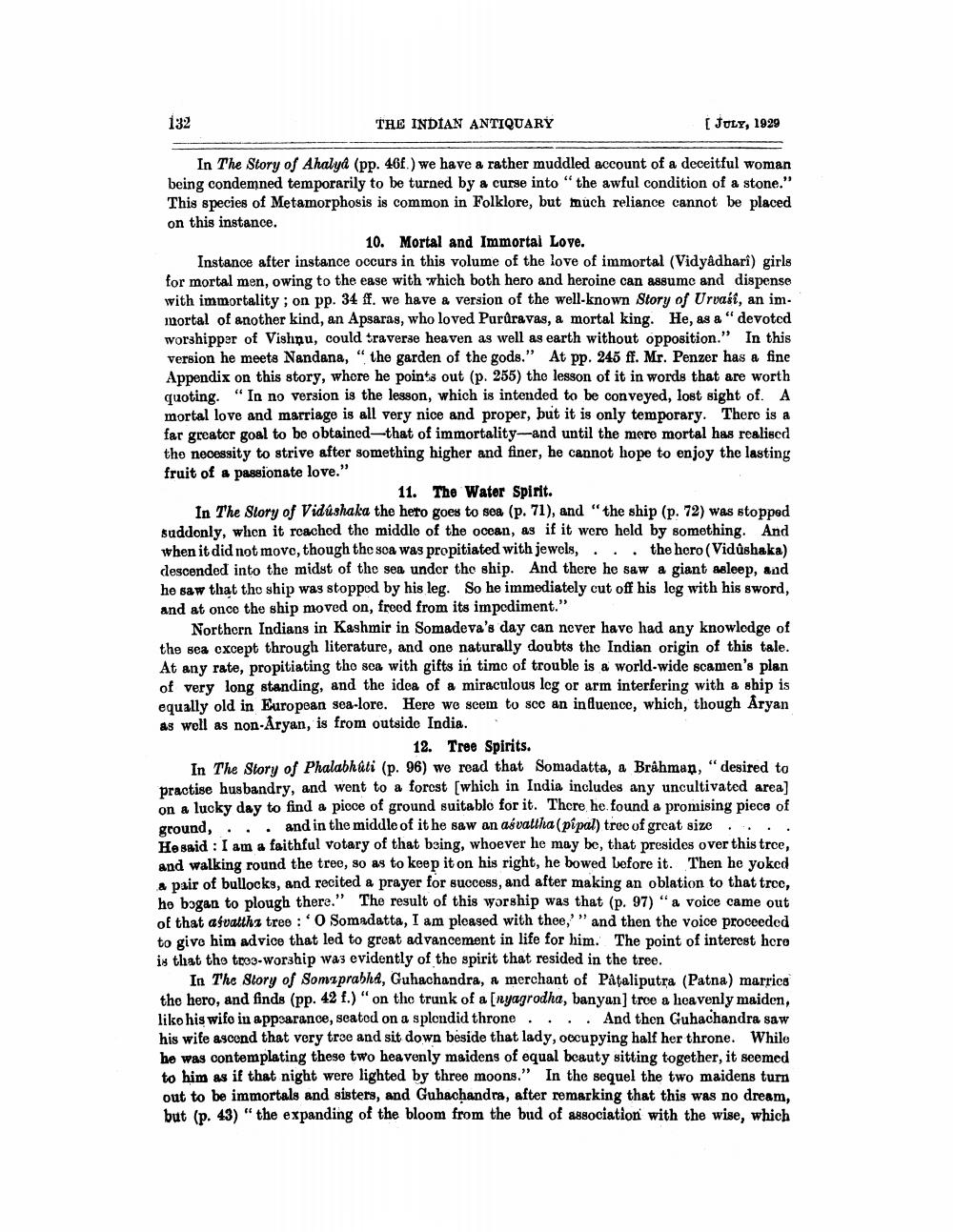________________
132
THE INDIAN ANTIQUARY
[JULY, 1929
In The Story of Ahalya (pp. 46f) we have a rather muddled account of a deceitful woman being condemned temporarily to be turned by a curse into "the awful condition of a stone." This species of Metamorphosis is common in Folklore, but much reliance cannot be placed on this instance.
10. Mortal and Immortal Love. Instance after instance occurs in this volume of the love of immortal (Vidyadhari) girls for mortal men, owing to the ease with which both hero and heroine can assume and dispense with immortality; on pp. 34 ff. we have a version of the well-known Story of Urvasi, an immortal of another kind, an Apsaras, who loved Purúravas, a mortal king. He, as a "devoted worshipper of Vishnu, could traverse heaven as well as earth without opposition." In this version he meets Nandana, "the garden of the gods." At pp. 245 ff. Mr. Penzer has a fine Appendix on this story, whore he points out (p. 255) the lesson of it in words that are worth quoting. "In no version is the lesson, which is intended to be conveyed, lost sight of. A mortal love and marriage is all very nice and proper, but it is only temporary. There is a far greater goal to be obtained that of immortality-and until the mere mortal has realised the necessity to strive after something higher and finer, he cannot hope to enjoy the lasting fruit of a passionate love."
11. The Water Spirit. In The Story of Vidushaka the hero goes to sea (p. 71), and "the ship (p. 72) was stopped Buddonly, when it reached the middlo of the ocean, as if it were held by something. And when it did not move, though the soa was propitiated with jewels, ... the hero (Vidůshaka) descended into the midst of the sea under the ship. And there he saw a giant asleep, and he saw that the ship was stopped by his leg. So he immediately cut off his log with his sword, and at once the ship moved on, frood from its impcdiment."
Northern Indians in Kashmir in Somadeva's day can never have had any knowledge of the sea except through literature, and one naturally doubts the Indian origin of this tale. At any rate, propitiating the sea with gifts in time of trouble is a world-wide scamen's plan of very long standing, and the idea of a miraculous log or arm interfering with a ship is equally old in European sea-lore. Here we seem to soc an influence, which, though Aryan as well as non-Aryan, is from outside India.
12. Tree Spirits. In The Story of Phalabhati (p. 96) we read that Somadatta, a Brahman, "desired to practise husbandry, and went to a forest (which in India includes any uncultivated area] on a lucky day to find a picce of ground suitablo for it. There he found a promising piece of ground,... and in the middle of it he saw an asvallha (pipal) treo of great size ... Hesaid: I am a faithful votary of that being, whoever he may be, that presides over this tree, and walking round the tree, so as to keep it on his right, he bowed before it. Then he yoked A pair of bullocks, and recited a prayer for success, and after making an oblation to that tree, he bogan to plough there." The result of this worship was that (p. 97) " a voice came out of that afvatthz tree : ' O Somadatta, I am pleased with thee,'" and then the voice proceeded to give him advice that led to great advancement in life for him. The point of interest here is that the trou-worship was evidently of the spirit that resided in the tree.
In The Story of Somaprabha, Guhachandra, a merchant of Pataliputra (Patna) marrics the hero, and finds (pp. 42 f.)" on the trunk of a [nyagrodha, banyan) troe a heavenly maiden, like his wifo in appsarance, scatod on a splendid throne...And then Guhachandra saw his wife ascend that very tree and sit down beside that lady, occupying half her throne. While he was contemplating these two heavenly maidens of equal beauty sitting together, it seemed to him as if that night were lighted by three moons." In the sequel the two maidens turn out to be immortals and sisters, and Guhachandra, after remarking that this was no dream. but (p. 43) " the expanding of the bloom from the bud of association with the wise, which




